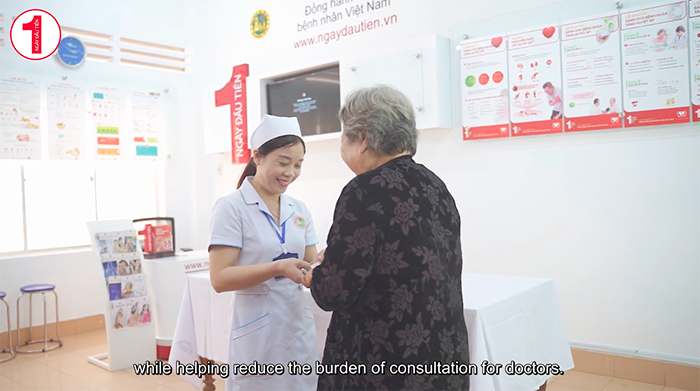Nurses, pharmacists or physicians: All play a key role for patients to understand and follow their treatments. To improve therapeutic adherence, at Servier, our teams especially rely on therapeutic education, an approach that consists of strengthening the relationship between health care professionals and patients. Experience from three of our initiatives in Vietnam, Greece and Australia.
Therapeutic adherence refers to the degree of agreement between the physician’s recommendations and the patient’s behavior. From a medical viewpoint, a patient is considered to be “non-adherent” if they are following less than 80% of their treatment1.
Read the opinion piece by Arnaud Lallouette: “Therapeutic adhesion, the missing piece to care for chronic diseases?”
Training Vietnamese nurses to streamline the health care process
In Vietnam, patients sometimes spend hours in the waiting room before they can see a physician.
To relieve hospital congestion and offer patients better medical follow-up, Servier Vietnam in collaboration with Vietnam Heart Association, Vietnam Association of Diabetes & Endocrinology and HCM Medical University have launched a wide-ranging training program for nurses: the Ngày Dầu Tiên (“First Day”) project. Now at the heart of the health care process, nurses are responsible for consult and educate hypertensive and diabetes patients by:

The benefit is threefold:
In Greece: focusing on the close relationship between pharmacists and patients
Since 2020, Servier Greece has been training hundreds of pharmacists on the difficulties patients face in adhering to their treatment. These trainings, offered under the auspices of the CONCORD initiative (see below), aim to enhance communication between pharmacists and patients so that pharmacists can educate patients on the importance of closely following their treatment.

“We train pharmacists to find the right words for each patient. Indeed, very often, the lack of therapeutic adherence is linked to a poor understanding of the issues of treatment. As the healthcare professionals come most regularly in contact with patients, their impact is key in medical follow-up.”
Alexandra Beletsi, Medical Affairs Director, Servier Greece.
The results show that regular follow-up by a healthcare professional has a positive impact on therapeutic adherence: between the first month and the fifth, the patient adherence rate, measured by a qualitative questionnaire, increased by more than 20%.2.
The CONCORD* study conducted by Servier’s teams in Greece aimed to demonstrate the effect of an educational program for pharmacists on therapeutic adherence. In 2022, the study evaluated the impact of training 133 pharmacists on the adherence of 1,146 patients over a four-month period. The results showed an average improvement of more than 20%2 in the adherence of patients on the different parameters evaluated.
Partnering with the leading pharmacy network in Australia
In Australia, one in ten people is thought to have depression.3 However, studies show that 60% of patients stop following their treatment to the letter within the first three months.4
In the face of poor treatment adherence, Servier Australia have partnered with MedAdvisor SolutionsTM, the world leader in pharmacy-driven patient engagement solutions, to develop a tailored digital program to improve therapeutic adherence for patients suffering from depression.
This program has been a great success, especially thanks to the involvement of all stakeholders. Pharmacies, as the healthcare setting most frequently accessed by patients, have played a crucial role in supporting patients to overcome adherence hurdles.
“The digital solution was installed on the “PlusOne” platform, which is present in more than 95%5 of Australian pharmacies. This allowed all professionals to be involved in this support program and to understand the issues of adherence to support patients throughout their journey.
Julia Busacca, Franchise Lead – Neuropsychiatry, General Medicine Business Unit, Servier Australia
One year after the launch of the program, engagement rates exceeded expectations. On average, the patients who benefited from the program showed improved adherence with nearly five additional months of prescription, and as a result, better compliance and a lower drop-out rate!”
In Australia, pharmacists are among the three most trusted healthcare professionals in the eyes of patients6, making the pharmacy an ideal channel for informing patients about their health care process and adherence issues.
Therapeutic adherence in figures:
50%
It is estimated that less than 50% of patients are properly receiving the prescribed monthly treatment7
¼
About ¼ of the drugs prescribed by physicians would never be consumed by patients8
120 billion
The lack of therapeutic adherence would cost about 120 billion euros in Europe.9

[1] MPRsc ≥ 80% – calculated using data from IMS Health’s LifeLink and EPPM databases
[2] CONCORD study “Convince for the monitoring by the Pharmacists of patients with Dyslipidemia, Hypertension and Chronic Venous Disease compliance” (https://pubmed.ncbi.nlm.nih.gov/38106368/
[3] Australian Bureau of Statistics. 2018. National Health Survey: Mental Health. Available from (https://www.abs.gov.au/statistics/health/mental-health/mental-health/2017-18).
[4] Rossom RC, Shortreed S, Coleman KJ, et al. Antidepressant adherence across diverse populations and healthcare settings. Depress Anxiety, 2016; 33: 765–74. (ANTIDEPRESSANT ADHERENCE ACROSS DIVERSE POPULATIONS AND HEALTHCARE SETTINGS – PubMed (nih.gov))
[5] MedAdvisor Solutions (https://www.medadvisorsolutions.com/en-au/#aboutus)
[6] The pharmacy guild of Australia (Pharmacists again top-rated with patients – The Pharmacy Guild of Australia)
[7] Medication Adherence Measures: An Overview – PMC (nih.gov)
[8] Etude Observatoire Jalma, étude Observance (https://www.lemoniteurdespharmacies.fr/ressources/upload/imgnewspha/depot/synthese-observatoire-observance.pdf)
[9] Université de Genève : https://www.unige.ch/lejournal/recherche/printemps-2023/adhesion-traitement/ (consulté en juin 2024)
